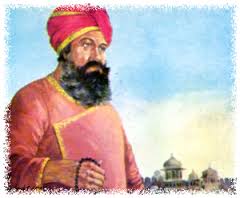
PIPA, one of whose hymns is incorporated in the Guru Granth Sãhib, was a prince who renounced his throne in search of spiritual solace. He was born at Gagaraun, in present-day Jhalawar district of Rajasthãn, about AD 1425. He was a devotee of the goddess Bhavãni whose idol was enshrined in a temple within the premises of his palace. The goddess, it is said, once told him in a dream to visit Kãshi (Vãrãnasi) and receive initiation from Rãmãnand. Pipã went to Kãshi, but Ramãnand refused to see him in his gaudy robes. Pipã cast off his royal apparel and put on a mendicants garment. He returned home after initiation and began to live like an ascetic. At his invitation Ramãnand visited Gagaraun, and the raja lent his shoulder to the palanquin carrying him in a procession.
Pipa now finally decided to give up his throne and retire to a life of seclusion and meditation. He wept to Dwarkã (Gujarãt) where Lord Krishna, after the Mahãbhãrata war, had spent the last years of his life. All the twelve wives of.Pipa insisted on accompanying him, but he took along only one, named Sitã, who was of a pious temperament. He selected a cave for his residence from where he daily walked through a tunnel to the temple of Krsna on the sea coast. The temple is still a popular place of pilgrimage. and a fair is held there annually in Pipas memory. After what he thought was a personal encounter with the Lord, he gave up idol-worship. He and his companion-wife started living in a jungle. After a period of penance, he set out roaming about the country to serve the common people. He, along with his wife, sang hymns and prayers of his own composition and collected money to be distributed among the poor. He fed the mendicants and treated them as Gods chosen ones. From an idol-worshipper (saguna bhakta) Pipã became a worshipper of the Formless One (nirguna devotee). As he says in his hymn in the Guru Granth Sãhib, the body itself is the Supreme Beings temple (káiau deval). One need not make stone images of Him and burn incense or light candles in front of them.
Two collections of Pipas sayings are known to exist, namely Shñ Pipa ji Bani and Sarab Gutaka, both in manuscript form. Pipã Math, a monastery in Dwãrkã, honours his memory.
Shabad by Bhagat Pipa
The body is the temple, the place of pilgrimage, and the pilgrim.
Within the body are incense, lamps and offerings.
Within the body are the flower offerings. || 1 ||
I searched throughout many realms,
but I found the nine treasures within the body.
Nothing comes, and nothing goes;
I pray to the Lord for Mercy. || 1 || Pause ||
The One who pervades the Universe also dwells in the body;
whoever seeks Him, finds Him there.
Pipa prays, the Lord is the supreme essence;
He reveals Himself through the True Guru.
Extracted from Gurbani De Racheta by S Abnashi Singh and Gurvinder Singh.
Published by: Gaganmai Thaal International,Jandiala Guru,Amritsar
Excerpts taken from Encyclopedia of Sikhism by Harbans Singh .
Published by Punjabi University, Patiala
Sikh Bhagats
Baba Sheikh Farid Ji
Bhagat Kabir Ji
Bhagat Ravidas Ji
Bhagat Beni Ji
Bhagat Namdev ji
Bhagat Sadhana ji
Bhagat Bhikhan Ji
Bhagat Parmanand ji
Bhagat Sain ji
Bhagat Dhanna Ji
Bhagat Pipa ji
Bhagat Surdas ji
Bhagat Jaidev ji
Bhagat Ramanand Ji
Bhagat Trilochan ji
